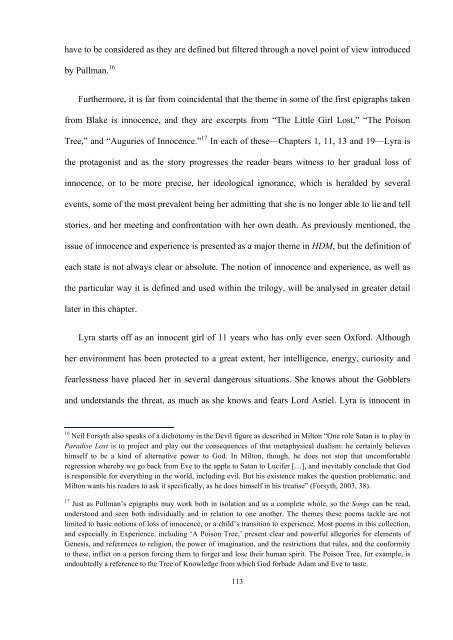The secular angel in contemporary children's literature: David ...
The secular angel in contemporary children's literature: David ...
The secular angel in contemporary children's literature: David ...
Create successful ePaper yourself
Turn your PDF publications into a flip-book with our unique Google optimized e-Paper software.
have to be considered as they are def<strong>in</strong>ed but filtered through a novel po<strong>in</strong>t of view <strong>in</strong>troduced<br />
by Pullman. 16<br />
Furthermore, it is far from co<strong>in</strong>cidental that the theme <strong>in</strong> some of the first epigraphs taken<br />
from Blake is <strong>in</strong>nocence, and they are excerpts from “<strong>The</strong> Little Girl Lost,” “<strong>The</strong> Poison<br />
Tree,” and “Auguries of Innocence.” 17 In each of these—Chapters 1, 11, 13 and 19—Lyra is<br />
the protagonist and as the story progresses the reader bears witness to her gradual loss of<br />
<strong>in</strong>nocence, or to be more precise, her ideological ignorance, which is heralded by several<br />
events, some of the most prevalent be<strong>in</strong>g her admitt<strong>in</strong>g that she is no longer able to lie and tell<br />
stories, and her meet<strong>in</strong>g and confrontation with her own death. As previously mentioned, the<br />
issue of <strong>in</strong>nocence and experience is presented as a major theme <strong>in</strong> HDM, but the def<strong>in</strong>ition of<br />
each state is not always clear or absolute. <strong>The</strong> notion of <strong>in</strong>nocence and experience, as well as<br />
the particular way it is def<strong>in</strong>ed and used with<strong>in</strong> the trilogy, will be analysed <strong>in</strong> greater detail<br />
later <strong>in</strong> this chapter.<br />
Lyra starts off as an <strong>in</strong>nocent girl of 11 years who has only ever seen Oxford. Although<br />
her environment has been protected to a great extent, her <strong>in</strong>telligence, energy, curiosity and<br />
fearlessness have placed her <strong>in</strong> several dangerous situations. She knows about the Gobblers<br />
and understands the threat, as much as she knows and fears Lord Asriel. Lyra is <strong>in</strong>nocent <strong>in</strong><br />
16 Neil Forsyth also speaks of a dichotomy <strong>in</strong> the Devil figure as described <strong>in</strong> Milton “One role Satan is to play <strong>in</strong><br />
Paradise Lost is to project and play out the consequences of that metaphysical dualism: he certa<strong>in</strong>ly believes<br />
himself to be a k<strong>in</strong>d of alternative power to God. In Milton, though, he does not stop that uncomfortable<br />
regression whereby we go back from Eve to the apple to Satan to Lucifer […], and <strong>in</strong>evitably conclude that God<br />
is responsible for everyth<strong>in</strong>g <strong>in</strong> the world, <strong>in</strong>clud<strong>in</strong>g evil. But his existence makes the question problematic, and<br />
Milton wants his readers to ask it specifically, as he does himself <strong>in</strong> his treatise” (Forsyth, 2003, 38).<br />
17 Just as Pullman’s epigraphs may work both <strong>in</strong> isolation and as a complete whole, so the Songs can be read,<br />
understood and seen both <strong>in</strong>dividually and <strong>in</strong> relation to one another. <strong>The</strong> themes these poems tackle are not<br />
limited to basic notions of loss of <strong>in</strong>nocence, or a child’s transition to experience. Most poems <strong>in</strong> this collection,<br />
and especially <strong>in</strong> Experience, <strong>in</strong>clud<strong>in</strong>g ‘A Poison Tree,’ present clear and powerful allegories for elements of<br />
Genesis, and references to religion, the power of imag<strong>in</strong>ation, and the restrictions that rules, and the conformity<br />
to these, <strong>in</strong>flict on a person forc<strong>in</strong>g them to forget and lose their human spirit. <strong>The</strong> Poison Tree, for example, is<br />
undoubtedly a reference to the Tree of Knowledge from which God forbade Adam and Eve to taste.<br />
113
















